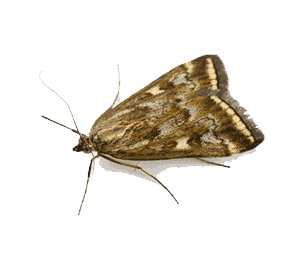We Are Indian Meal Moths Exterminators
EnviroPest has been protecting local homes and families for over 30 years. Our exterminators provide a variety of treatments, including our all-natural Indian Meal Moth pest control that will effectively deal with your issue without requiring you to leave the comforts of your home. As a company committed to the organic and proper application of pesticides, our residential pest control solutions have been the right fit for over 100,000 families.
The Indian Meal Moth has pale gray wings, but the front wing is reddish-brown and coppery on the outer two-thirds. The mature larva is usually dirty white but may vary to greenish, pinkish, or brownish, depending on the food it eats; the head region is yellowish to reddish-brown. Indian Meal Moths enter structures in boxes and bags of food from grocery stores. This cosmopolitan insect’s larvae will feed on cracked grain; coarser grades of flour such as whole-wheat or graham flour and cornmeal (Indian meal) products; dried fruits, shelled nuts, and others. Examples include raisins, dried apple, peanuts, chocolate, and powdered milk. Other foods are birdseed, biscuits, bread meal, breakfast foods, cereals, cornmeal, corn starch, cookies, crackers, dry dog and cat food, flour, garden seeds, and red peppers.
Our Industry Leading Indian Meal Moth Extermination Method
We Start with a Thorough Investigation
Although adult Indian Meal Moths can fly into your house from outdoors, this is not a likely way an infestation begins in your New York home. The most common way you can get an Indian Meal Moth infestation by bringing it home with you from the store.
During the processing stages in manufacturing facilities, Indian Meal Moths will infest and reproduce in the food products themselves. It’s easy to bring home a food item with moth eggs or larvae already in it. Soon they will become adults that lay more eggs in your pantry items, furthering the infestation.
Find The Source
Here Are Some Tips For Preventing Infestations
- Check your Items: When you’re shopping for food, it’s vital to assess the items of the things that moths are probably going to infest before you put them into your cart. Guarantee that the things you pick are in boxes or sacks that are free from damage, being open or damaged.
- When You Return Home: Examine the items and placed them in a sealed container. Fortunately, Indian Meal Moths principally surface feeders, so if there are any hatchlings present, you’ll probably observe them at the head of the food when you open the bundle. On the off chance that there is spacing in the items, they may descend a couple of layers, so you might need to check somewhat more detailed before choosing whether or not the food is truly free from Indian feast moths.
- Change Your Home Environment: Indian meal moths thrive in humid environments, so keeping moisture levels down in your home, and especially in your pantry, is a must. Use dehumidifiers to reduce humidity and fans to promote good airflow.
- Although Indian meal moths are more likely to get into your house through infested food, it’s wise to take precautions to prevent them from getting in from outside too. Keep doors shut when not in use. Ensure that open windows are covered with screens that are free of holes or tears. Seal any gaps that you find around your windows and doors.
Indian Meal Moth Exterminator
Call Today! (855) GET-ENVIRO
Who To Hire
What to Look for When Hiring a Indian Meal Moth Exterminator
- The pest management company should be licensed by the state and insured.
- Technicians should be certified pest management professionals and fully licensed in the state.
- The company should be a member of a professional organization, such as the National Pest Management Association.
- The company should have a staff entomologist or access to one.
- Technicians should have experience as an Indian Meal Moth exterminator.
- Choose a company based on their quality of service, not the price. Research user reviews and testimonials to solidify your choice.
- A pre-inspection should be conducted to assess the scope of the work.
- The proposed work should follow the steps of integrated pest management, not just pesticide application.
The EnviroPest Complete Service Guarantee
If at any time between services or your guarantee period, you as a customer of EnviroPest are not satisfied for any reason. We will readdress the area in question at no additional charge. We have serviced over 300,000 homes and businesses over 30 years, and our clients rely on us to stand behind the work we perform.
Our continuous inspection and treatment mean a 100% guarantee as long as you have us on the property.
Our service personnel has been trained and certified with over six (6) years of experience in the pest control field as specialists. We do not advocate or provide seasonal labor or “college kids” to provide applications in or around your family or home. Another reason we are the natural choice in pest control.
ASK THE INDIAN MEAL MOTH EXTERMINATORS:
Why aren’t do it yourself (DIY) treatments effective for Indian meal moths?
When searching for Indian Meal Moth exterminators, you will often find traps to purchase. These traps use pheromones to lure moths to them. Once the Indian Meal Moths arrive at the trap, they get stuck in a sticky substance and can’t escape.
Bait traps may prove mildly useful at capturing some Indian Meal Moths. Unfortunately, trapping will usually only eliminate the adults. The more extensive infestation the more likely they will continue to reproduce and, you will not rid of the issue with only traps. Also, the fuller the trap gets, the less effective it becomes.
Can Indian meal moths cause damage?
Meal moth larvae can damage grains and other foods stored in your pantry, mostly by spinning massive amounts of silk, which collects fecal pellets, discarded skin, and eggshells in food. Indian Meal Moths damage more food by contaminating it than by eating it. Adult meal moths don’t feed. If you see winged moths in your pantry, you’ll know you have a meal moth infestation.
How do I get Indian meal moths into my home?
Indian meal moths enter homes usually by contamination of store-bought foods. All dry, grain foods are possible carriers of the insect. The insect’s larvae are often sealed right into a package; until opened, there would be no sign of the food carrying the larvae.
Why do I find these moths in different locations of home when I don’t have food there?
The moths are phototropic, meaning they are attracted to light.
When the infestation source has no lighting, it will fly to the closest source of light, making them spread to other locations of your home.
What types of foods are they attracted and should I remove them from my home?
The food products to check to include milled foods such as flour, pasta, cereals, cornmeal, spices, and most commonly, dry pet foods, including birdseed.
Other sources to check are dried fruit, nuts, and even decorative wall hangings containing food products such as corn or beans. Inspect all products, and if any signs of the insect are present, remove them from your home immediately.
I removed the source of the Indian meal moths; how do I still have an infestation?
Once airborne, the moth will began to seek light first and then a place to mate.
High cracks and crevices, wall hangings, and other voids will harbor a mating place. Eggs are then laid in these conducive areas, thus producing moths away from the infestation’s source.
Read about one of our customers and their story about dealing with Indian Meal Moths.
You can also use the onsite chat feature, Free Pest Inspection form on this page, or our online contact form to get in touch with us. Whatever your pest control need, we are happy to help you eliminate it.
Featured Product Lines:

We have used EnviroPest for many years and HANDS DOWN, they are top-notch. Any issues that come up they address immediately. The EnviroPest technician was very informative and did a very thorough job. We would recommend this company to anyone!





